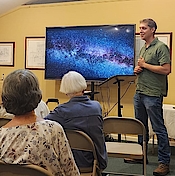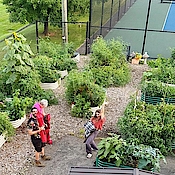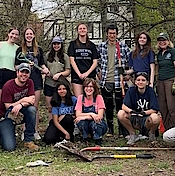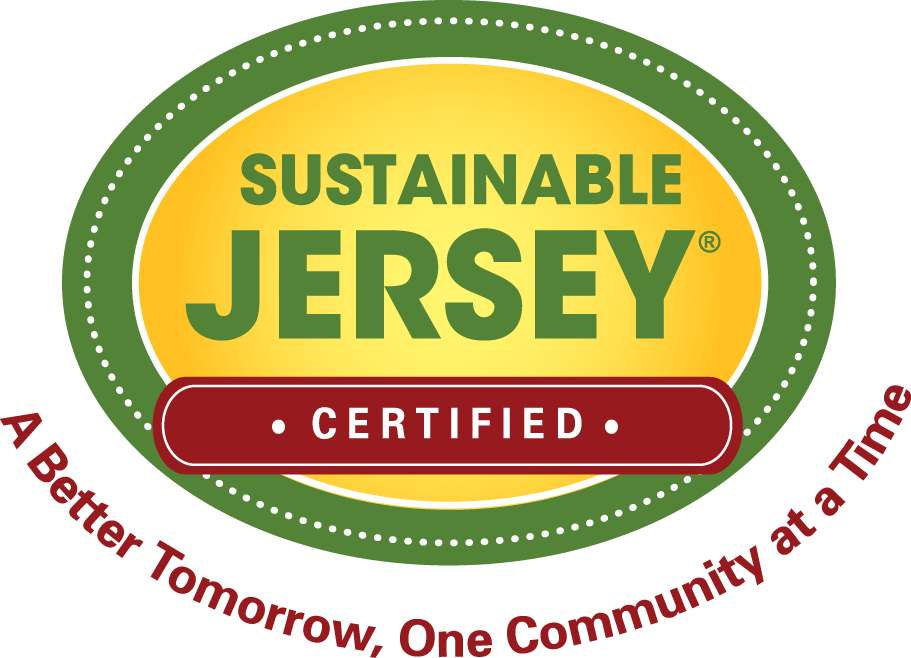Sustainability in Action
In the Winter 2024 issue of the Sustainable Jersey Newsletter:
- New Toolkit Provides Guidance to Reduce, Recover and Recycle Food Waste in NJ Pre K-12 Schools
- Town of Clinton Educates Community to Reverse Local Light Pollution (Hunterdon County)
- Somerville Thrives with Addition of Jay Scott Community Garden (Somerset County)
- Ridgewood High School Students Secure Grant and Lead Planting of 17 Native Trees (Bergen County)
- Funds Available to Develop Community Energy Plans and Implement Projects
New Toolkit Provides Guidance to Reduce, Recover and Recycle Food Waste in NJ Pre K-12 Schools

Sustainable Jersey for Schools and Rutgers Cooperative Extension have released a new online toolkit: Reduce, Recover & Recycle Food Waste for PreK-12 Schools. This clearinghouse of best practices and resources is designed for school leaders looking to reduce food waste while also promoting healthy food and addressing food insecurity.
The free toolkit shares how to perform waste audits; reduce and recycle organic food waste and waste from food packaging; recover uneaten food; train staff on how to implement food service best practices; educate and engage students; run school-wide campaigns; and use school gardens to promote sustainable food knowledge and behaviors.
Each toolkit chapter clearly identifies who should be involved in the task; explains what needs to get done; and provides the necessary resources, worksheets and links to applicable Sustainable Jersey for Schools actions. There are 17 school spotlights that share a real-life example or application of the step being outlined in the section. For example, users of the guide will learn about the changes that the George L. Catrambone School and their student food waste warriors have implemented in their cafeteria.
Three New Jersey schools participated in the pilot study that resulted in the guide recommendations: Halsted Middle School in Newton, Delran Middle School in Delran and George L. Catrambone School in Long Branch. The pilot resulted in a 95% reduction in food waste. The schools composted any food waste generated and diverted 21,300 pounds of unopened food items to share tables. This resulted in the prevention of an equivalent of 207,720 pounds of carbon dioxide entering the atmosphere. You can hear firsthand about the school’s experiences by viewing the webinar: Adventures in School Food Waste.
Funding for the project was provided by the New Jersey Department of Environmental Protection, through its Division of Sustainable Waste Management and the toolkit builds upon the State of New Jersey’s School Food Waste Guidelines K-12 Edition. The toolkit also highlights the Sustainable Jersey for Schools actions that correspond to the food waste reduction practices, for example it includes the actions: Waste Audit; Food Service Training & Best Practices to Reduce Food Waste; Promote Locally Grown Foods; Food Recovery - Share Tables & Donation; Food Waste Recycling or Composting, and more.
Town of Clinton Educates Community to Reverse Local Light Pollution (Hunterdon County)

In partnership with the Red Mill Museum and the NJ Sierra Club, the Town of Clinton Green Team hosted a community event to educate the community about light pollution and discuss actions that residents, businesses and the town can do to bring the night sky back.
The event began with a screening of the award-winning 16-minute documentary about light pollution and why darkness matters titled Dark Sacred Night. The short film, a storytelling project of Princeton University's Office of Sustainability, was created by New Jersey-based journalist and documentary filmmaker Jared Flesher. Flesher led a discussion after the showing. He shared that light pollution is a problem that impacts far more than stargazers. New studies show that excessive amounts of outdoor lighting contribute to a range of human health problems, waste energy and have a dramatic negative impact on wildlife. The group learned that light pollution also impacts children who live in neighborhoods with lower socio-economic status. Light pollution is more prevalent in those areas as light is often thought of as a means of preventing crime.
“This event was the first step in our educational efforts to ask residents to take individual action and encourage the town to pass a light pollution ordinance,” said John Kashwick, Town of Clinton Councilman, and the chair of the green team. “Also, we’re collaborating with partners to promote legislation at the state level that would require the new lighting installed or funded by the state to be energy efficient and dark sky friendly. We hope this educational effort can be used as a model for other green teams across New Jersey.”
There are many ways to tackle the over-lighting of the night, such as changing light fixtures outside homes or businesses; using timers and motion sensors; updating town streetlights and more. Simple solutions to light pollution can be summed up in a few words: make lights dimmer, shield lights so they only shine downward and use warm-colored lightbulbs. Resources for more information include the NJ Sierra Club Light Pollution page and the DarkSky website. The Town of Clinton is Sustainable Jersey certified at the bronze-level and received points for this event as part of its submission for the action: Community Education & Outreach.
Somerville Thrives with Addition of Jay Scott Community Garden (Somerset County)

The Jay Scott Community Garden became a reality in 2023 thanks to the hard work of many volunteers and a collaboration between the Borough of Somerville, the Somerville Environmental Commission and the green team.
The 1,400-square-foot garden sits on borough-owned land and is located behind the firehouse on Veterans Memorial Drive. Fourteen planting beds were built and equipped with water and storage space. One planting bed is wheelchair accessible and two raised beds are handicap accessible. Garden tools and wheelbarrows are provided.
Volunteers maintain the garden beds and donate extra produce to local food banks when available. In just the first year, the garden produced a yield of diverse veggies, fruits and flowers, including some very impressive watermelons. The Borough’s Department of Public Works provided mulch, soil and fencing in addition to ongoing staff support for maintenance. The garden is dedicated in memory of John Jay Scott, a master gardener who spent many years on the Borough’s Recreation Commission and advocated gardening throughout Somerset County.
Rebecca Reitman-Garofalo, a member of the Somerville Environmental Commission who is overseeing the project said, “This garden has been a wonderful addition to our borough. We’ve strengthened our community by connecting with each other and partnering to create the garden. Engaging in community service provides us all with the opportunity to become active and closer with our neighbors which has a lasting, positive impact on society at large and for the sustainability of our town.” The group plans to expand the garden to include 22 planting beds. Residents interested in volunteering can sign up to help: https://bit.ly/Somerville_Turn-Intentions-into-Actions.
A $2,000 Sustainable Jersey grant funded by the PSEG Foundation supported the launch of the garden and the Somerville Recreation Commission provided additional funding. The Borough of Somerville is certified with Sustainable Jersey at the silver-level. Follow the Somerville Environmental Commission on Facebook or Instagram.
Ridgewood High School Students Secure Grant and Lead Planting of 17 Native Trees (Bergen County)

When the Village of Ridgewood had to cut down nearly 100 diseased ash trees due to damage caused by the invasive emerald ash borer, students from the Ridgewood High School Green Team took action. Encouraged by their green club faculty advisor, Miles Luo, the students helped apply for and secure a $2,000 Sustainable Jersey for Schools grant funded by the New Jersey Education Association.
Using the funds, the students planted 17 native trees near an athletic field on the high school campus to provide shade, minimize flood damage and reduce the chance of sports balls ending up in a nearby brook. Nearly 30 students, staff and members of the Ridgewood Shade Tree Commission volunteered to help and participate in a demonstration of proper tree planting techniques. This work was done as part of Ridgewood High School's first Sustainability Day.
Ridgewood High School Environmental Science and Biology Teacher Miles Luo said, “These students did more than beautify their neighborhood. They learned how to write a grant and implement a sustainability project that is important to them. The goal is for these trees to provide ecosystem services such as shade, soil stabilization and water purification. The trees will also provide educational opportunities and hands-on experiences for our science classes.” Ridgewood High School, certified at the bronze-level with Sustainable Jersey for Schools, received points for their collaboration with the Village of Ridgewood through the action: Civic & Stewardship Volunteer Initiatives. Follow the Ridgewood High School Green Club Instagram to learn more about the impressive initiatives this group of students and school are doing: @RHS_GreenClub.
Funds Now Available to Develop Community Energy Plans and Implement Projects

The New Jersey Board of Public Utilities (NJBPU) has extended the application deadline to May 24, 2024, for the Community Energy Plan Grant (CEPG) Program and the Community Energy Plan Implementation (CEPI) Program.
The CEPG and CEPI programs empower local communities to create and implement community energy plans that align with the State’s Energy Master Plan. A total of nearly $8M is available, with $4.5M earmarked for the CEPG Program and $3.4M earmarked for the CEPI Program in FY24. Funds have been budgeted from the State’s Clean Energy Program and are supplemented by the Department of Energy’s Energy Efficiency and Conservation Block Grant Program.
Administered by NJBPU’s Office of Clean Energy Equity, both programs focus on helping New Jersey’s overburdened municipalities. The CEPG program allows overburdened municipalities to be eligible for larger grants; while all New Jersey municipalities are eligible for $10,000 grants, those deemed overburdened are eligible for a larger $25,000 grant. In addition, in partnership with NJBPU, Sustainable Jersey provides technical assistance to all CEPG and CEPI applicants, with a particular focus on overburdened municipalities. Enhanced technical assistance for overburdened municipalities includes preparation of applications and assistance in developing community energy plans. Sustainable Jersey created a Community Energy Plan Resources Guide to help municipalities engage in community energy planning. For municipalities that would like to participate in either the CEPG or CEPI program, applications are available here. The application window will be open until May 24, 2024.
